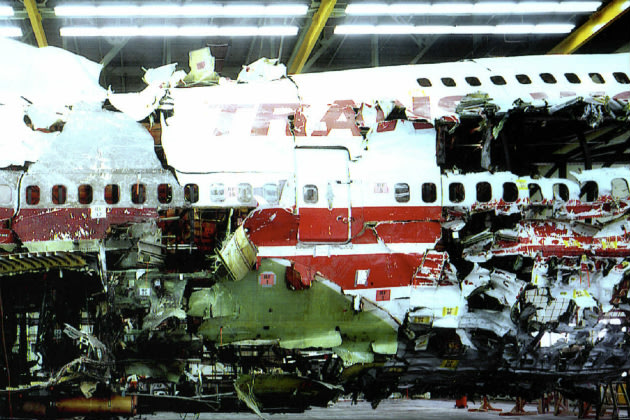
By Dylan Stableford
The reconstruction of TWA Flight 800's fuselage. (Daniel Brooks/Epix)
The producers of an upcoming documentary on TWA Flight 800—which exploded and crashed into the waters off Long Island, N.Y., on July 17, 1996, killing all 230 people on board—claim to have proof that an explosion outside the Paris-bound flight caused the crash. And six former investigators who took part in the film say there was a cover-up and want the case reopened.
"There was a lack of coordination and willful denial of information," Hank Hughes, a senior accident investigator for the National Transportation Safety Board, said Wednesday during a conference call with reporters. "There were 755 witnesses. At no time was information provided by the witnesses shared by the FBI."
Jim Speer, an accident investigator at the time of the crash for the Airline Pilots Association, who sifted through the recovered wreckage in a hangar, said he discovered holes consistent with those that would be formed by a high-energy blast in the right wing. He requested it be tested for explosives. When the test came back positive, he said, he was "physically removed" from a room by two CIA agents.
They would not speculate on the reasons for the alleged cover-up.
After a four-year investigation, the NTSB concluded the plane was destroyed by a center fuel tank explosion likely caused by a spark from faulty wiring.
But according to Tom Stalcup, a co-producer of the documentary, the investigators have new "radar and forensic evidence proving that one or more ordnance explosions outside the aircraft caused the crash." The film, will premiere on EPIX on July 17, the 17th anniversary of the crash.
"These investigators were not allowed to speak to the public or refute any comments made by their superiors and/or NTSB and FBI officials about their work at the time of the official investigation," a news release announcing the documentary said. "They waited until after retirement to reveal how the official conclusion by the (NTSB) was falsified and lay out their case."
The investigators filed a petition to the NTSB calling for a new probe. The NTSB had said it would review any petition related to the 1996 crash, which touched off one of the most complex air disaster investigations in U.S. history.
The CIA and FBI conducted a parallel investigation to determine if a bomb or missile had brought down the plane.
Dozens of eyewitnesses in the Long Island area "recalled seeing something resembling a flare or firework ascend and culminate in an explosion," the CIA said in a 2008 report. "Had the crash been the result of state-sponsored terrorism, it would have been considered an act of war." Also from the report:
The CIA responded to the FBI’s request within 24 hours of the crash. This support consisted primarily of help from the Counterterrorist Center in the Directorate of Operations and from a small group of analysts in the Office of Weapons, Technology and Proliferation in the Directorate of Intelligence.
But after an eight-month investigation, the CIA "concluded with confidence and full substantiation that the eyewitnesses had not seen a missile."
The CIA's deputy director of intelligence wrote in a 1997 memo,"Our analysis demonstrates that the eyewitness sightings of greatest concern to us—the ones originally interpreted to be of a possible missile attack—took place after the first of several explosions aboard the aircraft."
"We went back and interviewed these people and found them to be quite credible," Hughes said Wednesday.
He added: "We have no hidden agenda here; we just want the truth."
No comments:
Post a Comment